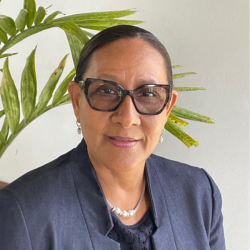Pediatricians are advocates for babies and moms. They play a larger role than most expect.
The idea of seeing a pediatrician before your child is out of the womb might not make sense at first. However, longtime pediatrician and professor Dr. Rhonda McIntyre endorses the American Academy of Pediatrics (AAP) recommendation on the importance of prenatal visits and discusses the reasons for it.
says Dr. McIntyre, senior associate dean of external affairs and medical sciences at Ross University School of Medicine, part of Adtalem Global Education.
The data show that less than 5% of expectant mothers in a poor urban setting and who are at high risk for unfavorable outcomes see a pediatrician, according to the AAP.
she says.
The pediatrician’s consultation should include a comprehensive medical history addressing:
Family history including genetic problems and psychosocial risk factors.
Social determinants of health that could impact the newborn.
“The pediatrician also provides guidance and support to the expectant mom about what she should expect after the baby is born, which is essential information that a new mom needs for her baby’s well-being,” she adds.
says Dr. McIntyre.
Dr. McIntyre should know. She was in clinical practice for most of her career and was head of pediatrics at Princess Margaret Hospital in Dominica for more than 18 years. That included overseeing in-patient and outpatient pediatric services and managing high-risk and intensive care units for babies and children. It’s given her a broad view of the challenges and wins in pediatrics and maternal health care.
Pediatricians Caring for Mom
Providing the best care for a new baby means taking care of new moms too. It helps when pediatricians spend time getting to know the expectant mom and the family before the baby arrives.
says Dr. McIntyre. “And should be on the lookout for problems and factors that may adversely affect them both.”
There may be a range of issues that can be easily addressed; however, more serious issues such as domestic violence and postpartum depression need to be addressed urgently. Pediatricians who have started building trusting relationships with families can better assess a mother’s situation, she says. “This is important as we know that a mom’s mental and emotional state can impact the baby’s well-being.”
Pediatricians also need to be vigilant in evaluating mothers for conditions that occur before birth, such as hypertension and diabetes, that may continue into the postpartum period. Pediatricians can advise, provide resources, and initiate referrals that lead to better outcomes for the mother and the newborn.
Checking on a new mother’s welfare is an important role for pediatricians even at a well-baby visit. “It’s well-known that mothers are less likely to engage in accessing healthcare post-delivery,” says Dr. McIntyre.
"With the focus now shifted to their infant, they put their own healthcare on hold and may not attend their physician visits as their time is now invested in being a mother. It’s very important for pediatricians to advocate on behalf of families to ensure that a new mother is getting adequate care."
Readiness for Complications and Advocacy for Resources
says Dr. McIntyre.
During her time as a practicing pediatrician in Canada and in the Caribbean, Dr. McIntyre saw babies born with various complications and abnormalities. This is particularly challenging in low-resource settings as she experienced in the Caribbean. With limited access to tertiary care facilities, sometimes there was little that could be done in situations where specialized medical or surgical interventions weren’t available immediately, or in a 24- or 48-hour window where life-saving interventions were needed, such as with congenital heart defects.
The experience inspired her to make connections in the Caribbean and beyond across medical and surgical pediatric subspecialty services. The need for funding to support some of the services resulted in the creation of the Children’s Heart Fund (CHF), a nonprofit that brought together physicians, nurses, business partners, nonprofits, and community members.
For more than 30 years, the CHF has raised funds to help families access healthcare for their newborns, infants, and children, locally, regionally, and even internationally. During that period the services have been upgraded with more sophisticated equipment and access to more specialized services; however, advocacy continues where needed.
“When you work in communities where resources are not as readily available to deliver essential healthcare, it brings into focus the health disparities impacting the vulnerable.” she says.
Specifically in the area of maternal and child health, stakeholders who are responsible for the delivery of care need to elevate their voices as advocates and experts in the field.
Preparing Medical Students to Be Advocates
Dr. McIntyre says it is important for medical students to have patient contact early in the Doctor of Medicine program and understand issues around health equity. At Ross University School of Medicine, early exposure in community settings includes experiences at maternal and child health clinics in Barbados.
“Our students are exposed to real-world community medicine starting in semester one. They take part in the advocacy around maternal and child health issues by engaging in health education sessions as part of their experience,” says Dr. McIntyre. “They are expected to carry out patient interviews and focus on social determinants of health and participate at well-child clinics including immunization clinics. As a way to prepare students for real-world advocacy, they develop a community-based health promotion intervention which can be around maternal health, and with an opportunity for implementation.
For more information, email the Adtalem Global Communications Team: adtalemmedia@adtalem.com.




